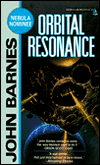
 Jo Walton on tor.com recommended Orbital Resonance; in fact she recommended most of John Barnes's work, although she warned that much of it doesn't make for pleasant reading. As I'm now digging up my TBR list I'm actually following through on many of her picks, and she's a good match for me. This book fits in the genre slot as some of Heinlein juveniles and the response books to him, such as Alexei Panshin's Rite of Passage -- kids in space grow up and show us their society, especially the bits that haven't firmed up yet.
Jo Walton on tor.com recommended Orbital Resonance; in fact she recommended most of John Barnes's work, although she warned that much of it doesn't make for pleasant reading. As I'm now digging up my TBR list I'm actually following through on many of her picks, and she's a good match for me. This book fits in the genre slot as some of Heinlein juveniles and the response books to him, such as Alexei Panshin's Rite of Passage -- kids in space grow up and show us their society, especially the bits that haven't firmed up yet.
Orbital Resonance takes place in a world gone seriously wrong -- plagues and environmental destruction have left the remnants of humanity huddled on a few domed cities, while hastily built giant asteroid space ships orbit between Earth and Mars providing the only hope of enough resources to keep humanity alive. The adults all grew up in the collapsing societies of Earth, but our narrator, Melpomene, grew up in the ship and finds all the news stories about dire conditions on Earth remote and boring. She's more concerned with her school work, which involves lots of cooperative grading and consensus building, the social ramifications of the new kid's arrival, and her brother's performance in the prestigious ship-surface races.
I like the mix of story and world building - as Walton points out, it's hard to notice the grim truth of the society since Melpomene's acceptance and approval of it resounds through the narrative. All the children have been raised to value service to the ship and each other; competition is valued as a way to improve performance but trying to rise by pushing down other people is abhorred. The adults in fact deliberately set out to create children steeped in these values, but they don't really understand what a society formed by the kids would look like. Orbital Resonance catches this society as it emerges, and gives readers a chance to judge the parents who set it up.
1 comment:
Sounds like quite an interesting exploration of social constructs, albeit in space :)
Thanks for sharing your review!
Shelleyrae @ Book'd Out
Post a Comment